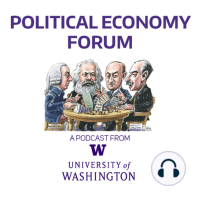56 min listen

#15 - Big Tech and Antitrust Policy - w/ Victor Menaldo
#15 - Big Tech and Antitrust Policy - w/ Victor Menaldo
ratings:
Length:
71 minutes
Released:
Nov 30, 2020
Format:
Podcast episode
Description
In this episode, Professor Victor Menaldo and Nicolas Wittstock explore the facts, logic, and evidence behind the consumer welfare approach to antitrust. That approach asks very simple questions: what is the effect of mergers between competitors or the behavior of firms with market power on prices and innovation? Since the early 1980s, this paradigm—away from a populist “big is bad” approach—has undergirded some of the greatest innovations the world has ever seen, including smartphones, software, and digital platforms that connect the globe together while charging a price equal to zero for their services.
The consensus that antitrust should be exclusively about the price of goods and services and innovation is currently under attack by some scholars, pundits, politicians, and advocacy groups. Critics claim that lax antitrust has led to increased market concentration and monopolies in the tech sector, ushering in “less entrepreneurship”, “restrictions on free speech”, “lower privacy protections”, and “the abuse of consumer data”. Companies like Amazon are accused of harming players up and down the retail supply chain from selling their own goods in a digital marketplace they control or pricing out brick and mortar retailers. They are also accused of exacerbating inequality and being too systemically important due to their size, market impact, interconnectedness, and low “substitutability”. Finally, there is the fear that big tech firms’ economic power translates into political power and is bad for democracy.
We set the record straight on what digital platforms actually are (explain the economics of multi-sided markets), what market concentration actually says about competition and consumer welfare (fewer rivals may imply greater efficiency and thus lower prices), how to define and measure “monopoly” (none of the big tech firms satisfy the definition), how to identify whether firms abuse their market power to crimp competition (a technical issue that is actually quite rare) and what remedies, if any, should be employed by policymakers in relation to digital platforms. We suggest that breaking up big tech is a radical solution in search of a problem.
The consensus that antitrust should be exclusively about the price of goods and services and innovation is currently under attack by some scholars, pundits, politicians, and advocacy groups. Critics claim that lax antitrust has led to increased market concentration and monopolies in the tech sector, ushering in “less entrepreneurship”, “restrictions on free speech”, “lower privacy protections”, and “the abuse of consumer data”. Companies like Amazon are accused of harming players up and down the retail supply chain from selling their own goods in a digital marketplace they control or pricing out brick and mortar retailers. They are also accused of exacerbating inequality and being too systemically important due to their size, market impact, interconnectedness, and low “substitutability”. Finally, there is the fear that big tech firms’ economic power translates into political power and is bad for democracy.
We set the record straight on what digital platforms actually are (explain the economics of multi-sided markets), what market concentration actually says about competition and consumer welfare (fewer rivals may imply greater efficiency and thus lower prices), how to define and measure “monopoly” (none of the big tech firms satisfy the definition), how to identify whether firms abuse their market power to crimp competition (a technical issue that is actually quite rare) and what remedies, if any, should be employed by policymakers in relation to digital platforms. We suggest that breaking up big tech is a radical solution in search of a problem.
Released:
Nov 30, 2020
Format:
Podcast episode
Titles in the series (92)
Magistro and Menaldo: Populist Economic Policy by Political Economy Forum